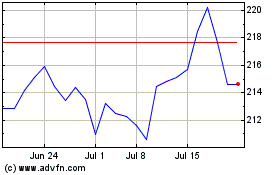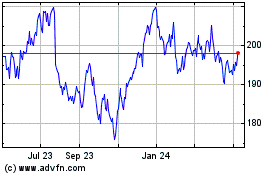By Asa Fitch and Ian Talley
This article is being republished as part of our daily
reproduction of WSJ.com articles that also appeared in the U.S.
print edition of The Wall Street Journal (June 6, 2018).
Dozens of major American companies are preparing to pull out of
Iran as the Trump administration closes a narrow legal window that
has allowed firms to operate there without violating U.S.
sanctions.
The companies using the exemption include big conglomerates like
Honeywell International Inc., Dover Corp. and General Electric Co.
and insurers like Chubb Ltd., many of which sought to profit from
growth in the Iranian energy industry. Some of the companies have
already booked millions of dollars in revenue from their Iranian
business, underscoring the high commercial stakes of the Trump
administration's decision to revive economy-crippling sanctions
against Iran.
In all, at least 17 U.S.-listed companies did business with Iran
using foreign subsidiaries after the Iran nuclear deal went into
effect in January 2016. Their total Iran-linked revenues since then
amounted to more than $175 million, according to an analysis of
Securities and Exchange Commission filings. Many more privately
held companies may also have done business in Iran through
subsidiaries but aren't subject to SEC disclosure rules.
Now some of those companies are hastening to shut down their
foreign subsidiaries' activity with Iran to avoid crushing U.S.
sanctions expected to begin taking effect in November.
President Donald Trump's move in May to exit from the nuclear
deal spells the end of the Obama administration's so-called General
License H, which allowed U.S. companies with foreign subsidiaries
to trade, finance, insure and invest in Iran. The exemption
afforded by the license was part of the carrot-and-stick approach
the Obama administration used to extract concessions from Iran,
using the promise of economic rejuvenation through U.S. investment,
though only indirectly through foreign subsidiaries.
Mr. Trump and his supporters saw the Iran deal as inadequate
because it failed to address Iran's military presence in the Middle
East and its development of ballistic missiles capable of reaching
U.S. allies like Israel. Like all the other sanction exemptions the
administration is revoking over the next six months, U.S. officials
say yanking License H is designed to isolate Iran politically,
financially and economically as Washington tries to pressure Tehran
into a fundamentally new military stance in the region.
"These sanctions will further cut the Iranian regime off from
abusing the global financial system," said Sigal Mandelker,
Treasury's undersecretary for terrorism and financial
intelligence.
The U.S. Treasury says U.S.-based firms operating under that
license have until Nov. 5 to wind down their operations or risk
penalties -- the same time frame for new bans against other
dealings with Iran's economy except for some specially licensed
trade in medical and food goods.
The withdrawal has drawn a fiery response from Iran, which has
vowed to quickly scale up its nuclear program if European leaders
can't work out an agreement to continue the deal without the U.S.
On Tuesday, Ali Akbar Salehi, the head of Iran's atomic agency,
said the country had constructed new infrastructure for building
advanced-enrichment centrifuges, according to the official Islamic
Republic News Agency. Centrifuge development hadn't started,
however, and the activities at a facility in the central city of
Natanz were currently within the strictures of the nuclear deal, he
said.
License H was designed to ease crippling sanctions imposed by
the Obama administration in 2012 once the nuclear deal took effect
in 2016. It gave companies a way around remaining U.S. sanctions on
Iran for terrorism, human-rights violations and its
ballistic-missile program.
Unlike several European companies such as Siemens AG, Renault
and oil giant Total, which made splashy moves into Iran, few
American firms drew attention to their Iranian dealings. But many
had big plans for a market with a population of around 80 million
people and some of the world's largest oil and gas reserves.
Now some are heading for the exit.
Illinois-based Dover, a manufacturing conglomerate, said the
revocation of License H would end its business in Iran. Dover had
been selling spare parts for pumps used in Iran's energy
infrastructure and was set to earn more than $16 million in revenue
from contracts signed there since the beginning of 2017, according
to regulatory filings.
The Wall Street Journal reported last week that GE is pulling
back from its foreign subsidiaries' work in Iran. The company had
revenue of about $24.8 million on sales of valves and spare parts
for Iran's energy industry, among other contracts, according to
regulatory filings.
"We are adapting our activities in Iran as necessary to conform
with recent changes in U.S. law," a GE spokeswoman told the Journal
last week. "GE's activities in Iran to date have been limited and
in compliance with U.S. government rules, licenses and
policies."
Honeywell has booked around $115 million of revenues from Iran
through its non-U. S. subsidiaries since the beginning of 2016,
largely in the past year, according to regulatory filings. Unless
Honeywell is able to fulfill $100 million in current contracts by
early November, it could lose future potential revenue, given that
the firm indicated in its SEC disclosures that those contracts
aren't yet completed.
U.S.-based Honeywell spokeswoman Victoria Streitfeld said the
company and its non-U. S. subsidiaries "operate within the
parameters of all applicable U.S. and international regulations and
will continue to do so."
"For those who have live contracts, they'll have to think about
how to wind them down," said Patrick Murphy, a Dubai-based lawyer
at Clyde & Co. specializing in sanctions regimes.
The License H exemption had limits and brought scrutiny on
companies using it. There were restrictions on the use of sensitive
technology with national-security implications, and the foreign
subsidiaries couldn't employ Americans.
The hoped-for benefits of the nuclear deal never fully
materialized for Iran. While the country was able to export more of
its oil, average Iranians didn't reap the rewards, as inflation and
unemployment rates remained in the double digits and remaining U.S.
sanctions deterred investment.
The end of the deal and the withdrawal of License H could cause
headaches especially for American insurers. A handful of them have
used the permission to cover whole fleets of ships, some of which
began calling at Iranian ports after the nuclear deal. Such
insurers could face penalties if they don't stop providing
protection for ships carrying oil and other cargo into Iranian
ports.
Validus Holdings, for example, said in its first-quarter report
that its non-U. S. subsidiaries provide coverage for ship cargo to
and from Iran, including crude oil and refined petroleum products.
The company declined to comment for this article, but said in its
March filing that it "intends for its non-U. S. subsidiaries to
continue to provide such coverage to the extent permitted by
applicable law."
Write to Asa Fitch at asa.fitch@wsj.com and Ian Talley at
ian.talley@wsj.com
Corrections & Amplifications GE had revenue of about $24.8
million on sales of valves and spare parts for Iran's energy
industry, among other contracts, from 2016 through the first
quarter of 2018, according to regulatory filings. An earlier
version of this article incorrectly gave the figure as $24.5
million. (June 5, 2018)
(END) Dow Jones Newswires
June 06, 2018 02:47 ET (06:47 GMT)
Copyright (c) 2018 Dow Jones & Company, Inc.
Honeywell (NASDAQ:HON)
Historical Stock Chart
From Jul 2024 to Aug 2024

Honeywell (NASDAQ:HON)
Historical Stock Chart
From Aug 2023 to Aug 2024
